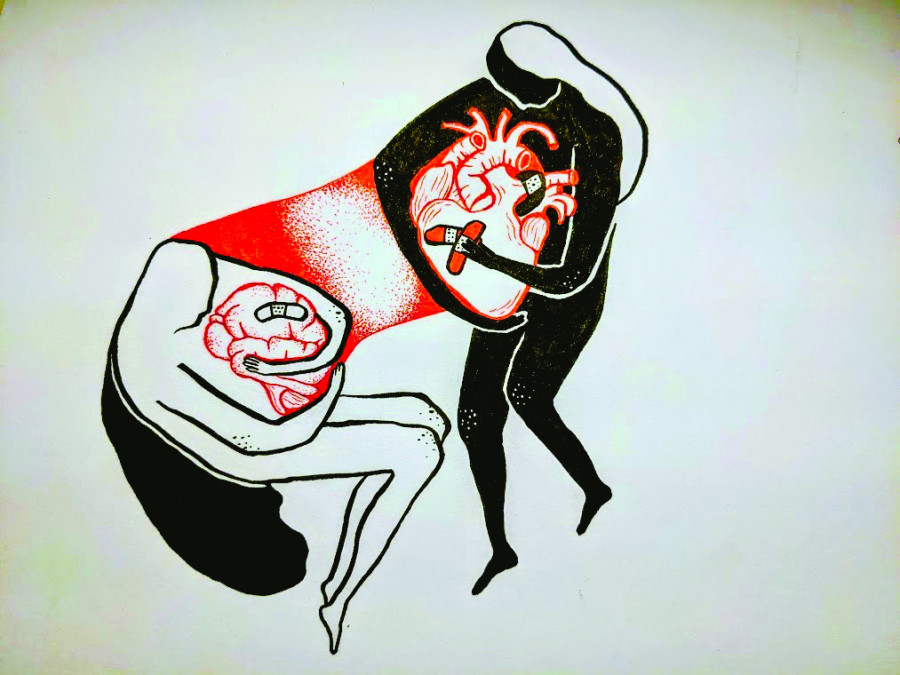Moving forward after experiencing sexual violence
Healing from sexual trauma may not be linear, but it is possible
TW: Discussion of sexual assault, trauma
Sexual abuse and sexual violence affects everyone in extremely different ways. Survivors carry experiences, feelings and stories that differ from one another and there is no one singular road to healing. But that’s not to say moving forward from sexual trauma is out of the question.
For 24-year-old nutrition student Sophie*, her story shifted from something she felt the need to hide, to one she now accepts and is open about. When she talks about her experience, she is reminded that it is nothing to feel ashamed about.
Sophie said she was 17 when she felt a bit of her innocence taken from her after an incident involving her guitar teacher. The teacher was close to her parents in age and had been teaching her guitar for years. “It was the end of the lesson and I had packed up to go [...] then he kind of got this glazed look in his eyes. It was really scary,” she said. “Then he kind of stepped forward and put his hands around my waist and under my jacket and shirt. He put his hands up my back and pressed himself up against me and I could feel his dick, he was hard, against my crotch area.”
Sophie said she immediately left, went home and quit guitar that night. “I’ve played a few times but I still miss it,” she said, explaining how this incident took away something she loved. “I would pick up a guitar and I would start sobbing because I would get flashbacks.”
“I haven’t been diagnosed with PTSD about it but I was so nervous around boys. I wouldn’t let anyone touch me for a few years. I would get flashbacks all the time,” she said. The incident severely heightened her anxiety and left her more susceptible to panic attacks. “Anything could set me off. It was insane,” she said.
At first, Sophie said she dealt with negative emotions of violation, mistrust, and betrayal. However, she has since come to accept what happened to her and it has allowed her mindset to shift to a more positive and empowering one. “I think I got sick of hiding it and I felt uncomfortable. I felt weird feeling like I needed to explain it to people,” she said.
The turning point for Sophie was when she shared her story with a friend. This came after suffering from a panic attack because she had been catcalled and her friend thought it was cool. She told him, “No, it’s objectifying, don’t you dare say that to me again.”
“Then I told him my story and it was kind of empowering for people to recognize that it’s not okay. Even the little things like catcalling. It might hurt someone, you don’t know everyone's story,” she continued.
Since this experience, Sophie has felt a roller coaster of emotions and a year ago she recognized that she wasn’t fully healed and needed to talk about it more. She has since sought professional counselling and said it has helped the healing journey.
Now in a healthy relationship of two and a half years, she has been able to communicate with her partner about her experience and past struggles with intimacy. “Before my partner and I engaged in anything physical, I made sure he knew my story and we always make sure when we have these deep conversations that we’re comfortable,” she said. “He was very receptive and understanding. He didn’t really understand what I felt but he was very open with it.”
For Emma*, a 25-year-old McGill grad student, finding helpful resources and proper sexual violence education did not come easy. Now a strong and devoted advocate for sexual violence prevention, she has found power and autonomy in her story through this advocacy.
At only 14, she experienced sexual violence which at the time she didn’t know it to be. “It got to a point where I just stopped resisting and I went along with things. I was in a situation where if I had screamed, shouted ‘no’ loud enough, someone probably would have heard and that violence wouldn’t have been carried out all the way,” she said. “So I carried a lot of guilt and blame from that situation for years because of that.”
It took until Emma was sixteen and attending a presentation about sexual violence for her to recognize she didn’t have to say no, and that not saying yes was enough. At seventeen she shared her story with some friends for the first time. When their reactions weren't entirely what she needed, she found talking about it wasn’t necessarily the best thing for her.
When it comes to supporting a friend confiding in you, she said allowing the conversation to be non-directional and fully guided by the friend is a good way to react.
“Just saying to myself: you didn’t consent and it wasn’t your fault that this happened, would have been life-changing.” — - Emma
Emma said she has found her long-term partner to be a good source of support. “I started to confide in him and he started to be that person I could turn to when I was having a panic attack or when things became too much,” she said. “I think even if it’s not a romantic relationship, survivors can get that through friendships too. It’s just finding those people who are going to be supportive of you and that are going to be there when you do need to call someone in the middle of the night.”
Eventually, Emma found deeper healing in her work in sexual violence prevention organizations. Now the co-president of a non-profit organization aimed to create a safe campus at McGill where survivors feel supported, the grad student is passionate about educating others about what she wished she had known when she was younger. “Just saying to myself: you didn’t consent and it wasn’t your fault that this happened, would have been life-changing,” she said.
Jennifer Drummond, manager of the Sexual Assault Resource Centre at Concordia, recommends those who are struggling with an experience of sexual assault to get in contact with available resources. “It’s really important to take care of yourself even if you’re not ready to talk about the incident,” said Drummond. “The basics are very important too. Eating properly, sleeping. Having social or family support. Even reaching out to a 24/7 support line with someone who is anonymous.” Drummond also suggested there are online resources you can look at if you don’t feel quite ready to talk.
In terms of supporting someone who opens up about their experience, she said being there to listen in a non-judgmental way, not blaming the person, and reassuring the person you believe them and that it wasn’t their fault, are key elements. “It sounds really simple but it makes a really big difference because it's something a lot of people are afraid of and it can be difficult to disclose to friends or family or anybody,” she said.
“Really asking a person directly I think is a good way to go because everyone is so different and needs different things in terms of support and has different comfort levels,” Drummond said referring to how to better support a loved one. She suggested sentences like these to create clear, comfortable and direct communication:
Do you want me to check in with you?
Do you not want me to bring it up?
What makes you feel supported?
How will I be able to tell you’re having a hard time?
When I see those things what can I do to help you? What will make you feel better?
Mostly Drummond wants survivors to know everything they’re feeling is normal and it’s up to them to decide what they want to do next and when. “There are people who believe you and support you and are out there to help you, and to help you at your own pace,” she said. “You’re not alone and there’s help.”
Sexual Assault Resource Centre:
Phone: 514-848-2424, ext. 3353
Email: sarc@concordia.ca
24/7 support - Montreal Sexual Assault Crisis Hotline:
Phone: 514-933-9007
*The Link has agreed not to reveal the identities of sources who are victims of sexual assault and has instead assigned pseudonyms.
This article originally appeared in The Gender & Sexuality Issue, published March 10, 2021.





_600_375_90_s_c1.jpg)
_600_375_90_s_c1.jpg)
